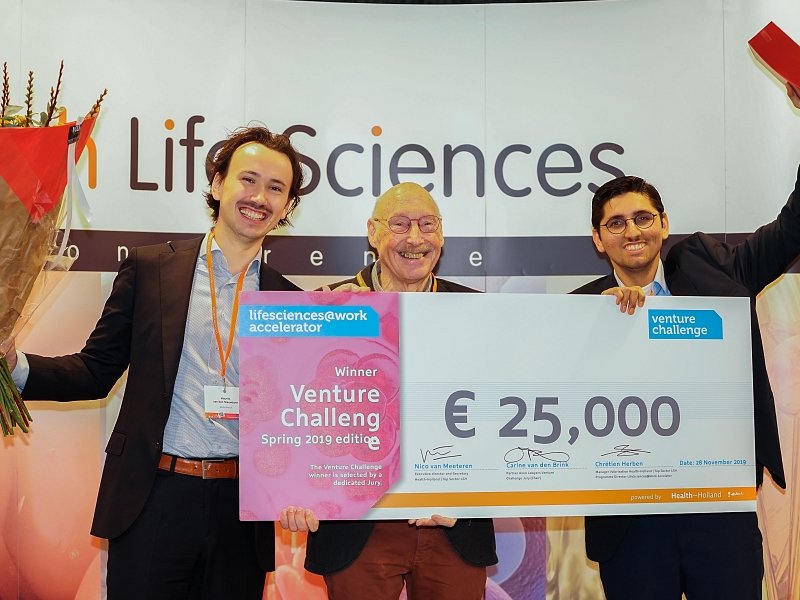
Every week we feature a new startup at Fundsup that forces a radical breakthrough. This time we chat with Digvijay Gahtory, CEO of Bimini Biotech.
Read the Dutch version on Emerce.
What exactly are you doing?
Bimini Biotech is developing novel therapeutics to target cancer via a unique molecular mechanism, the GH/IGF-1 axis. This technology is based on the pioneering research of Prof. Ger Strous at the University Medical Center Utrecht. Our compounds show promising anticancer activity in colon, breast, skin, lung and bone cancer, via an approach similar to Laron dwarfism. These dwarfs have a rare mutation that makes them resistant to cancer, diabetes and ageing, and we have found a method to emulate this. We now aim to bring this technology to patients. Our vision is to expand on our technology and build a sustainable biotech company by in-licensing promising early-stage assets from research institutes/pharma, that can solve unmet clinical needs beyond cancer – towards a disease-free world.
Where do you see its main application?
Despite large advances in therapeutics development, a clear need exists for new and efficacious medicines for various cancers. As reported by the Integrale Kankercentrum Nederland, in the past 10 years the life expectancy of metastatic cancer patients has only increased by a mere 1 month. For aggressive cancers such as colon, triple-negative breast and pancreatic, the situation is even further dismal. Thus, novel therapeutic approaches are needed to improve the life expectancy and quality of life of these patients. It is in areas of such high unmet need, where we see the application of our technology. We have identified colon cancer as the first indication, that we are currently pursuing.
“Our vision is to build a sustainable biotech company (…) that can solve unmet clinical needs beyond cancer – towards a disease-free world.”
What is the impact of your business?
The current standard of care for colon cancer treatment offers poor clinical response rates with over 30% of patients progressing to a metastatic stage, wherein the treatment options are very limited. We aim to deliver novel compounds that can either be an alternative to current targeted approaches (such as Cetuximab, Bevacizumab, Regorafenib, Trametinib etc.) or be used in combination with standard of care such as FOLFOX, FOLFIRI. Activation of the GH/IGF-1 axis has been linked to chemoresistance, the main reason for poor treatment response in many patients. Thus, our approach could have a clear scientific rationale for potential combination regimens. Beyond this approach, we aim to leverage our network and expertise to in-license additional interesting technologies from universities and further develop them towards the clinic.
Where do you stand right now?
Bimini was founded in late 2019 and since then we have pursued the development of our first lead compound – BM001, we have raised pre-seed financing, and built a strong core team of experts in the field. We are currently in the early pre-clinical stage of development for BM001, we have obtained solid in vitro and in vivo results in the colon and triple-negative breast cancer, and completed mechanism-of-action, drug metabolism, pharmacokinetics, bioavailability and initial safety studies.
When are you planning to go to the market?
Drug development has a long-time-to-market inherently. Our business model is to develop compounds to an early human safety and efficacy stage, and then co-develop with large pharma for Phase IIb and III studies. This will culminate in an eventual out-licensing of the therapeutic portfolio. We expect to attain a co-development deal by 2026 and a time-to-market of ~10 years for BM001. The exit value based on market precedents could be in the range of €300-400M.
Who has invested in you and what kind of investors are you looking for?
We have received ~€375k in a pre-seed financing from grants/awards (Venture Challenge 2019, Take Off Phase 1, Innowwide) and regional funds (UNIIQ and an informal). We are currently raising €1-2M in seed financing to complete the preclinical package, and expand the therapeutic portfolio.
What would be the ideal investor match?
The ideal investors would be those with a high-risk appetite at the seed/series A phase. In addition to capital, expertise and network in the deep-tech space would be beneficial.
Best of luck with everything!
Thanks, check out our pitch deck in the Fundsup app: https://api.fundsup.co/go/2Jo2TftTb